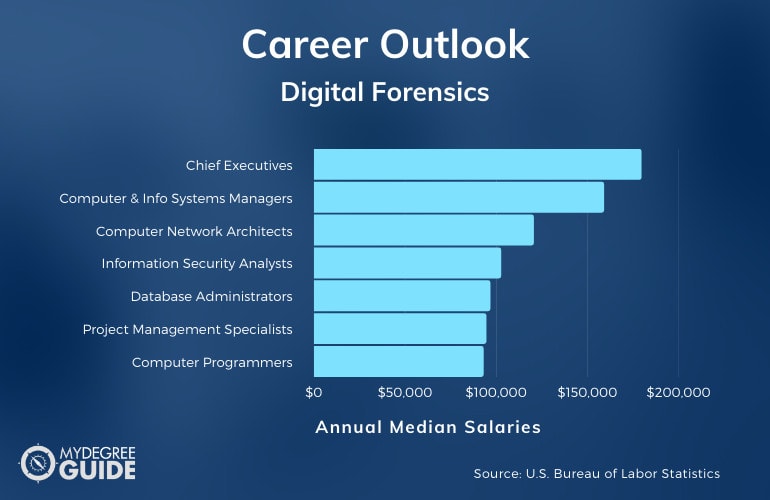The world of cybercrimes threatens the security of nearly every industry, and a masters in digital forensics could be the start of a new chapter in your career.

Digital forensics is the branch of investigative forensics that specifically targets cybercrimes. With nearly every industry utilizing online platforms and programs, cybercrimes can impact anyone, from a large business to a small family.
Editorial Listing ShortCode:
If you’re considering earning your digital forensics masters online, read on to learn more about the potential coursework, benefits, and professional paths associated with this graduate degree.
Universities Offering Online Masters in Digital Forensics Degree Program
Methodology: The following school list is in alphabetical order. To be included, a college or university must be regionally accredited and offer degree programs online or in a hybrid format.
Capella University
Capella University offers a Master of Science in Information Assurance and Cybersecurity with an emphasis in Digital Forensics. It aims to help students gain the necessary skills to respond to the growing issue of cyber-crime. The program can be completed fully online and consists of 6 core courses, 5 courses in digital forensics, and a final capstone.
Capella University is accredited by the Higher Learning Commission.
Champlain College
The Master of Science in Digital Forensics program at Champlain College aims to prepare students for digital forensic roles in corporations, state facilities, and law enforcement agencies. This 36 credit program is housed entirely online. Coursework is available to students around the clock to help ensure flexibility for students with even the busiest schedules.
Champlain College is accredited by the New England Commission of Higher Education.
DeSales University
DeSales University offers an online program for a Master of Arts in Criminal Justice with a concentration in Digital Forensics. It aims to teach students how to use the latest forensic tools and encryption techniques, review evidence, and conduct web-based investigations. Core courses include Criminology, Research Methods, Digital Investigation and Evidence Collection, and Network and Cloud Forensics.
DeSales University is accredited by the Middle States Commission on Higher Education.
Illinois Institute of Technology
Illinois Institute of Technology offers a Master of Science in Applied Cybersecurity and Digital Forensics. The program aims to prepare students for careers in the quickly expanding fields of cybersecurity and forensics. At the end of this 32 credit degree program, students may complete their studies with either a final thesis or project.
Illinois Institute of Technology is accredited by the Higher Learning Commission.
Michigan State University
Michigan State University welcomes students with both technical and non-technical backgrounds to join their Master of Science in Cybercrime and Digital Investigation program. Students can complete the program’s 30 required credits fully online. Most students can earn their degrees in 2 years or fewer with full-time course loads.
Michigan State University is accredited by the Higher Learning Commission.
Mississippi State University
Mississippi State University offers a Master of Science in Cyber Security and Operations. The program utilizes an interdisciplinary strategy to help students gain the dynamic knowledge required for success in the field. Students can tailor their education to better fit their scheduling needs and career goals. The program offers two concentrations to choose from: Cyber Defense or Operations.
Mississippi State University is accredited by the Southern Association of Colleges and Schools Commission on Colleges.
Norwich University
Norwich University offers a Master of Science in Cybersecurity. Students can choose a concentration in Computer Forensic Investigation, Critical Infrastructure Protection, Cyber Law, Project Management, or Government Contract Management. The program takes place primarily online but does require a 1 week, in-person residency. On average, students can complete their degrees in 18 months.
Norwich University is accredited by the New England Commission of Higher Education.
Sam Houston State University
Sam Houston State University offers a Master of Science in Digital Forensics. It is designed for students with undergraduate degrees in computer science or criminal justice who are interested in careers in digital forensics in public and commercial sectors. This 36 credit program is housed online and admits students in fall, spring, and summer semesters.
Sam Houston State University is accredited by the Southern Association of Colleges and Schools Commission on Colleges.
South College
South College offers a Master of Science in Criminal Justice with a concentration in Computer Forensic Investigation. This online program is designed to be flexible and accommodate the needs of professional students. The program focuses on both criminal justice theory and research involved in criminal justice professions. It focuses on web-based and digital crime.
South College is accredited by the Southern Association of Colleges and Schools Commission on Colleges.
Stevenson University
Stevenson University offers a Master of Science in Cybersecurity and Digital Forensics. The curriculum teaches how to identify, track, trace, and interpret digital forensic data, skills that are widely applicable and in high demand. Courses cover key topics like network testing, incident response, ethics and legal compliance, malware detection, and file systems forensic analysis.
Stevenson University is accredited by the Commission on Higher Education, Middle States Association of Colleges and Universities.
Strayer University
Strayer University offers a Master of Science in Information Systems in Computer Forensics Management. This program is designed for students interested in careers that aid in the prevention of digital theft, cybercrime, and online terrorism. The program consists of twelve 11 week courses, all of which can be completed online.
Strayer University is accredited by the Middle States Commission on Higher Education.
University of Central Florida
The University of Central Florida offers an online program for a Master of Science in Digital Forensics. It aims to equip graduates with the skills needed to address a variety of digital threats, cybercrimes, and online security concerns. This 30 credit degree has three admissions cycles each year and covers topics like wireless security forensics, evidence collection, and operating and file system forensics.
The University of Central Florida is accredited by the Southern Association of Colleges and Schools Commission on Colleges.
University of Maryland Global Campus
The University of Maryland Global Campus offers a Master Science in Digital Forensics and Cyber Investigation. The curriculum focuses on investigative skills, analysis of data and evidence, and hands-on skills. Students with qualifying credits can transfer up to 6 of the 36 required credits from outside institutions, and classes are offered online or in a hybrid format.
University of Maryland Global Campus is accredited by the Middle States Commission on Higher Education.
University of Nevada – Reno
The online Master of Science in Cybersecurity program at the University of Nevada—Reno is intended for students of all experience levels. The curriculum includes courses on internet security, systems administration, and cybersecurity law and ethics. The program can help prepare students for several high-demand and industry-leading certifications in the field of cybersecurity.
The University of Nevada – Reno is accredited by the Northwest Commission on Colleges and Universities.
University of New Haven
The University of New Haven offers a Master of Science in Digital Forensic Investigation. The program aims to help students develop skills in analysis, theory, and research and prepare them for the cutting-edge field of digital forensics. Most students can complete this 30 credit, fully online degree program in 1 year with a full-time schedule and 2 years with a part-time schedule.
The University of New Haven is accredited by the New England Commission of Higher Education.
University of North Dakota
The University of North Dakota offers a Master of Science in Cyber Security. This program is designed to prepare students of all undergraduate backgrounds for careers and industry certification in cyber security. It can typically be completed in 2 years. No GRE scores are required for admission, and the program admits new students three times a year in spring, summer, and fall terms.
UND is accredited by the Higher Learning Commission.
University of San Diego
The University of San Diego offers a Master of Science in Cyber Security Engineering that can be completed online or on campus. On average, students can complete this 30 credit degree in just 20 months. Courses are taken one at a time to help ensure accessibility and flexibility for professional students regardless of scheduling restrictions.
USD is accredited by the Accrediting Commission for Senior Colleges and Universities of the Western Association of Schools and Colleges.
University of the Cumberlands
The University of the Cumberlands offers an online program for a Master of Science in Digital Forensics. It is designed for individuals pursuing careers in information security analytics or digital forensic science. The program consists of 31 credits covering topics such as digital investigation, data triage, cyber security law, and wireless security.
University of the Cumberlands is accredited by the Southern Association of Colleges and Schools Commission on Colleges.
University of Wisconsin
In the Master’s in Cybersecurity program at the University of Wisconsin, students can customize their education to their professional interests and goals. They may choose a concentration in Digital Forensics, Cyber Response, Security Architecture, or Governance and Leadership. The program can be attended at one of several campuses or online and requires the completion of 34 credit hours.
The University of Wisconsin is accredited by the Higher Learning Commission.
Utica University
Utica University offers a Master’s in Cybersecurity. It has specialty tracks in Computer Forensics, Cyber Operations, Cyber Policy, Data Analytics, Electronic Crime, Intelligence, and Malware Analysis. The program’s 30 required credits can be completed online, typically in just 2 years.
Utica University is accredited by the Middle States Commission on Higher Education.
Online Masters in Digital Forensics Programs

Earning your online master’s in digital forensics can help you develop investigative and analytical skills that are necessary for those who work in fighting cybercrimes.
Digital forensics professionals are tasked with searching through digital data and records to recognize and gather evidence of a crime. That can also include preserving evidence in a tamper-free manner as well as analyzing or recreating the crime.
You can also engage knowledge of criminal law, including how to correctly identify and assess potential evidence. Digital forensics professionals are also responsible for creating reports regarding their findings and analysis.
Some of the topics focused on in an online master’s in digital forensics program include:
- Reverse engineering software tools
- Mobile data retrieval
- Cyber privacy, laws, and ethics
- Identification of cyber threats
- Security policy and system development
- Infrastructure evaluation
- Encryption and decryption
Depending on your interests and specialization, you could consider career paths in many fields. Some graduates use their masters in digital forensics to build or advance a career in security architecture, security analytics, or network security. Others work with law enforcement to investigate digital aspects of crimes.
You may choose to focus your studies on building the structures that enhance cyber security or on cracking down on the criminals who threaten online transactions. Overall, many online masters in digital forensics programs help students enhance their knowledge of how to find, track, and build a case against cyber criminals. Online forensic science degree programs, much like digital forensics graduate certificate online programs, can also help you grow your ability to analyze security structures for potential threats.
Digital Forensics and Cyber Security Careers & Salaries

There are many options for students of digital forensics and cyber security, depending on your particular interests. Those who prefer to build and design systems may take a hands-on approach to developing cyber security systems that stand up to today’s online threats.
Others may prefer to engage in the investigative aspects of digital forensics. Some graduates plan to pursue a career in teaching others. According to the Bureau of Labor Statistics, here are a variety of careers, along with their median salaries, related to digital forensics and cyber security.
| Careers | Annual Median Salaries |
| Chief Executives | $179,520 |
| Computer and Information Systems Managers | $159,010 |
| Computer Network Architects | $120,520 |
| Information Security Analysts | $102,600 |
| Database Administrators | $96,710 |
| Project Management Specialists | $94,500 |
| Computer Programmers | $93,000 |
| Network and Computer Systems Administrators | $80,600 |
| Postsecondary Teachers | $79,640 |
| Forensic Science Technicians | $61,930 |
Employment for information security analysts is anticipated to grow 33% over the next ten years (Bureau of Labor Statistics). As the global online community spreads wider, information security will continue to be a concern for many businesses.
Digital forensics and security experts may also choose to work in public and private sectors. For example, they might work for online retailers, financial institutions, local government, or even the military.
Master of Science in Digital Forensics Curriculum & Courses

When considering a master’s in computer forensics, you’ll have the opportunity to approach the courses from a criminal justice angle or from the perspective of a cybersecurity professional. The courses you take will be a reflection of your focus.
While each school offers their own unique curriculum, here are some of the courses that are often included in an online master’s in digital forensics program:
- Investigation Methods: This course helps you prepare to dig deep into cybersecurity matters in an appropriate and legal manner.
- Mobile Security: In this course, you’ll learn about security issues with common mobile devices.
- Ethics and Compliance in Digital Forensics: Privacy and ethical concerns are taught in this course to ensure investigations are conducted correctly.
- Evaluating Infrastructure Vulnerability: Technology is constantly changing, and this course helps students review security systems for potential threats.
- Network Forensics: Whether you’re working on an internal network or a web browser, this course can help you identify and prevent risks.
- Handling Digital Evidence: This course shares methods for retrieving, storing, and sharing digital evidence.
- Principles of Cryptology: You’ll gain insight into encryption and decryption methods to help you create or deconstruct cyber security boundaries as required.
- The Tools of Digital Forensics: In this course, you’ll learn how to investigate a variety of digital formats, including personal devices, media storage, and networks.
- Malware Analytics: You’ll learn about common offensive strategies by cyber criminals and how to build systems that stand up to these attacks.
- Blockchain Implementation: This course helps you get an understanding of how to create and implement your own blockchain system for advanced security.
Your school may also offer courses that focus on the criminal justice and litigation aspects of digital forensics. You can check each program’s curriculum for details.
Admissions Requirements

Many online digital forensics degree programs require a few specific items for admission, such as the following:
- GMAT or GRE scores (only some schools require them)
- Bachelor’s degree in a computer science-related field
- Transcripts of all undergraduate and any graduate work
- Letters of reference
- Personal statement
You will likely complete an online application, and you may be asked to provide an application processing fee as well. Each school will outline their unique admissions requirements within their application information.
Accreditation

As you begin exploring various masters in digital forensics online programs, it’s strategic to select a school that is regionally accredited. Credible regional accrediting agencies are recognized by the Council for Higher Education Accreditation (CHEA).
Schools that receive this accreditation status are recognized for their standards of excellence in a variety of areas, including their educational programs, faculty, and student services. Choosing an accredited school could help you qualify for financial aid and scholarship opportunities. Plus, an accredited degree is often preferred by employers and professional organizations.
To determine whether a program that interests you is accredited, you can search CHEA’s online database or contact the school directly.
Financial Aid and Scholarships

If the cost of tuition is holding you back, you may wish to investigate financial aid and scholarship opportunities. Completing the FAFSA, or Free Application for Federal Student Aid, will determine if you are eligible for needs-based federal aid programs. Your state may offer aid to qualifying students as well.
In addition, you may be able to apply to scholarships offered by your school or outside organizations. These are often based on academic merit or linked to a particular concentration of study. If you work in a computer or IT-related field, you could also look into employer-funded opportunities for continuing your education.
What Is Digital Forensics?

Digital forensics is a field that deals with cyber security and cyber crimes in our web-based society. Digital forensics professionals can have various responsibilities, from building security infrastructure that can withstand cyber attacks to investigating crimes that occur in a digital environment.
Most digital forensics programs include a blend of criminal science and computer science. You may also choose to focus more on the cyber security forensics or digital investigation aspects of this field.
Is Digital Forensics a Good Career?
Yes, digital forensics is a good career for many professionals. As you pursue your digital forensics masters online, you may choose to focus on cyber security and prevention measures. Alternatively, you might choose a career path that investigates criminal activity. Some digital forensics professionals work backwards from the scene of a crime to prevent further attacks.
The Bureau of Labor Statistics forecasts that careers in information security and digital forensics will continue to be on the rise over the next 10 years. A masters degree accompanied by experience may also help you qualify for senior or leadership positions in this growing field.
What Can You Do with a Masters Degree in Digital Forensics?

There are many specializations available to students who pursue a masters degree in digital forensics. You might consider a career in information security. Network architects and information security analysts may create, secure, and maintain systems for a variety of businesses, from local to global.
You might also consider a role in crime investigation. These types of professionals may work as forensic computer examiners or digital forensic analysts to uncover digital evidence and investigate cyber crimes. From government contracts to small online shops, many of those with an online presence are in need of cyber security and digital forensics professionals.
How Long Does It Take to Get an Online Master’s Degree in Digital Forensics?

A masters degree can generally be completed in 1 to 2 years. The amount of time required to complete a master’s degree in digital forensics online depends on the number of credit hours required by the program as well as your course load.
For example, it is possible for a student to complete a 36 credit hour program in 1 year, as long as they remain enrolled full-time and year round, including summer term. Programs that require thesis work may require additional time to complete. Attending school part-time may also increase the amount of time to complete a degree.
What’s the Difference Between an MS in Digital Forensics vs. Cyber Security?
There are many different programs that fall under the scope of digital investigation, including cyber security forensics and various components of law enforcement. Cyber security is a larger part of digital forensics, but there are a few key differences between these fields of study.
| Cyber Security | Digital Forensics |
|
|
There can be significant overlap between cyber forensics and cyber security, depending on your course of study.
What’s the Difference Between a Masters in Computer Forensics vs. Digital Forensics?
Some schools offer a master’s in computer forensics. In many cases, here’s how this field of study differs from digital forensics.
| Computer Forensics | Digital Forensics |
|
|
On the other hand, some schools and programs may use the terms of computer and digital forensics almost interchangeably.
Is a Masters in Digital Forensics Degree Worth It?

Yes, a masters in digital forensics degree is worth it for many students. The Bureau of Labor Statistics projects 16% job growth for forensic science technicians and 33% job growth for information security analysts over the next ten years, which is much faster than average.
Earning your masters in digital forensics degree can help you enter this field or advance your existing career, depending on your prior experience. A digital forensics graduate degree builds on your background in computer science or information technology. It dives deeper into the topic of cyber crimes, including how to investigate them and implement preventative measures.
You may have the opportunity to apply your skills to a variety of development or investigative professions to keep online users safe.
Getting Your Digital Forensics Master’s Degree Online

If the idea of combining your computer skills with your ability to analyze clues sounds intriguing, you might consider getting your digital forensics master’s degree online.
Technology is constantly evolving, and those with digital forensics skills can provide aid to many different industries, from commerce to municipal. As you take a look at programs and courses that interest you, it’s helpful to consider your long-term and short-term goals. Earning your masters degree in digital forensics online may open doors to a range of opportunities.
Exploring accredited universities that offer graduate programs in digital forensics could lead to the next step in your educational and professional journey.
